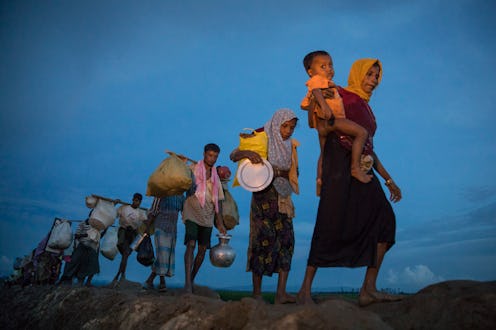News
Your U.S. Tax Dollars Could Be Funding Anti-Rohingya News Coverage

The Irrawaddy, a Rangoon-based media organization partly funded by the U.S. government, is being accused of using rhetoric that supports the ethnic cleansing of the Rohingya minority in Myanmar. Human rights campaigners and former employees of The Irrawaddy claim the publication has become a parrot for the Burmese government and the anti-Rohingya — something the news outlet denies. This would imply that U.S. taxpayer money funds unfair coverage of the Rohingya persecution. The publication's editor-in-chief has denied promoting anti-Rohingya sentiment.
In Myanmar (originally known as Burma), the military's massive crackdown on the mostly Muslim Rohingya began in late August in response to violent clashes between Rohingya insurgents and the government forces along the northwest border to Bangladesh. Since then, the army has been massacring and raping Rohingya people in Myanmar's Rakhine State, as well as destroying their villages. After accusations of crimes against humanity, the Myanmar military released a report exonerating itself from all alleged rapes and killings. The military claims its clearance operation has been necessary for national security, a view widely held by citizens in Myanmar.
The brutal, wide-scale operation has resulted in more than 2,000 deaths, including those from infanticide. Nearly 600,000 displaced Rohingya fled to Bangladesh for refuge in less than seven weeks since the pogrom began. The UN and human rights group Amnesty International have criticized the government under Nobel laureate Aung San Suu Kyi for defending the military operations or not doing enough to end the systematic abuses — although former U.S. ambassador to Myanmar Derek Mitchell said Suu Kyi does not have control over the military. Critics have also accused the Burmese media, including The Irrawaddy now, of biased reporting that reinforces a racist image of the Rohingya as Islamic separatists and illegal Bengali immigrants.
Last year the U.S. National Endowment for Democracy granted The Irrawaddy $150,000, reported The Daily Beast. For the past 20 years, the endowment has given donations to the publication with the aims of supporting free media in Myanmar. (Reporters Without Borders ranked Myanmar toward the bottom in the 2017 World Press Freedom Index at 131 out of 180 countries) Since the Burmese government has strictly controlled and censored the country's media since the 1962 coup coup d'état, Burmese exiles in Thailand founded The Irrawaddy in 1990 and the outlet was hailed as a bastion of independent Burmese press. But now the publication and its editor-in-chief Aung Zaw are facing scrutiny for how journalists are covering the Rohingya crisis.
When human traffickers left thousands of Rohingya stranded at sea in their attempt to escape persecution, The Irrawaddy published a cartoon of a dark-skinned man cutting in line in front of other ethnic minorities. The man is wearing a sign that says "Boat People. The publication also packaged a story on a Rohingya terrorist attack as a recent news story when the attack had happened a year ago, pandering to fears of separatist insurgency.
In September the website falsely claimed that Mitchell, during his time as U.S. ambassador to Myanmar, had warned the "self-identifying" Rohingya “would demand territory — a Rohingya State or Muslim State” if their ethnic name were officially recognized. The Burmese version of The Irrawaddy refers to the Rohingya as Bengali, the same rhetoric used by extreme nationalists in Myanmar. “They will be called Bengali anyway… that’s why I think the Burmese language editor has chosen to use Bengali," Zaw told The Daily Beast in defense of the wording. Zaw has denied claims that his publication is influenced by the government or anti-Rohingya sentiment in the country. Nevertheless, since September, three of The Irrawaddy’s journalists have resigned over its coverage of the Rohingya persecution.
The Rohingya crisis itself seems to be misunderstood in international community, said Mitchell to The Atlantic. He described the notion of ethnicity in Myanmar, and the historical conflict between the Bengali-speaking Muslims in Rakhine and the Buddhist majority, as more complex than just human rights abuse — although "it’s true [the Rohingya] are largely innocent and uniquely abused."
While the United States has responded to the abuses against the Rohingya by withdrawing military aid to Myanmar and considering sanctions, the National Endowment for Democracy has not commented on whether it will continue to donate money to The Irrawaddy.